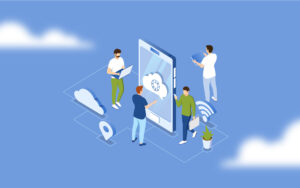Embracing the Mobile Workforce
The mobile workforce and innovations to support such a workforce are growing at a very fast pace, thanks to technology. The traditional office is no longer a requirement for employees to communicate effectively, work productively, and contribute efficiently. According to an article by Forbes Magazine, 81% of CEO’s see mobile technology as being strategically important for their enterprise. In fact, studies show that allowing employees the flexibility to work using mobile technology can often increase productivity and the overall morale of the company.
So, what are the criticisms and how can we address them? Or better yet, how does technology actually turn these into positives?
Communication
Many find that it is difficult to effectively communicate with team members, colleagues, and clients without face-to-face interaction. However, with recent innovations, this is no longer the case. There are many means and methods to chat, including email, phone, text, electronic messaging, or video conferences. The latter creates the feeling of an “in-person” meeting without actually being present. These technological capabilities will enhance communication while eliminating geographic restrictions.
Although there are also several benefits of being away from the office, this mobile workforce technology will allow you to work remotely with the same capabilities you have at your desk. An advantage of being away from the office is the freedom to choose another space without all of the distractions from the office (i.e. loud phone calls, group meetings, etc). Working remotely can limit distractions, reduce frustration among employees, and allow individuals to focus on the task at hand. In fact, according to data compiled by business coaching company Davitt Corporate Partners, 91% of remote workers believe they “get more work done when working remotely.”
Collaboration
With the tools available, a mobile workforce can help foster a more collaborative atmosphere. We now have screen sharing capabilities that are accessible by virtually all electronic devices. Many people on different electronic devices can work on the same documents. This allows each person to feel as though they can contribute and see the work as the team collaborates on it together.
Distractions
A frequent concern is that not working in a typical office environment is distracting for employees. This is often a concern of those that have not embraced the mobile workforce. However, this is not the case. Texting and other forms of instant messaging can often provide efficient means to work with coworkers. For example, an instant message asking a quick question certainly takes a lot less time and distraction than heading over to another employee’s cubicle.
Employees with faults at work will also have apparent faults in a mobile workforce. However, rejecting the future of work environments won’t change this. Those that are disciplined may truly shine when offered the benefits of these types of work environments (freedom and ability to work from a more comfortable and less distracting environment, less stress, saving time and money on commuting and other expenses, etc.) and through that, the company will shine as well. Embrace the future and the results will speak for themselves.
If your company has remote workers or a mobile workforce, Level365 has a Unified Communications platform with mobile options that can keep everyone connected while enhancing efficiency and productivity.
About Level365: Level365 offers a complete Unified Communications as a Service (UCaaS) solution with enterprise voice. Our service helps companies embrace a mobile workforce with seamless integration of business voice communications among desk phones, computers,





